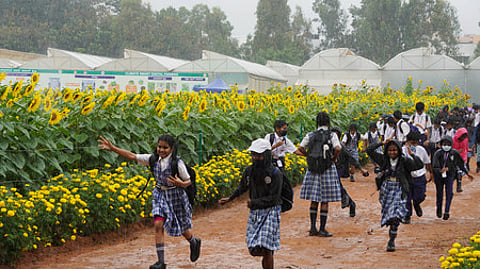

BENGALURU: Following the Union Government’s recent decision to scrap the ‘no-detention’ policy for classes 5 and 8, educationists have strongly opposed the move, arguing that it undermines rights-based legislations. They warned that the amendment could lead to higher dropout rates.
Under the revised system, students failing their exams will be granted a re-exam within two months, but those failing again will be held back in the same class. Experts term the concept as a ‘conservative idea’ and argue that holding a child back in class 5 or 8 not only stigmatises them as ‘fit for failure,’ but also leaves them with no extra support or resources to help them tackle the same syllabus for another year.
Development Educationist Professor Niranjanaradhya VP pointed out that the recent amendments are a deliberate attempt to weaken the Right to Education (RTE) Act.
The Right of Children to Free and Compulsory Education aims to ensure every child between the ages of 6 to 14 receives free and mandatory education. A key provision - section 16 - barred schools from detaining or expelling any student until they completed elementary education. The clause specifically stated that no child enrolled in school could be held back in any grade or removed from school during this period, Prof Niranjanaradhya explained.
Prof Niranjanaradhya called the recent changes a ‘deliberate attempt to dilute the Act’ and urged the government to reject the detention. He highlighted that the no detention policy is often seen as ignoring assessments or learning, but it rather stands for implementing a continuous and comprehensive evaluation system to monitor a child’s learning progress.
Experts argue that the idea behind the policy was that making a child repeat a class could discourage them and lead to dropping out. They say that a student’s failure in exams could stem from flaws in the education system itself and stress that exams as the only assessment method opposes the child-friendly approach the RTE Act originally promoted.
Lokesh T, a member of Karnataka Private Educational Institutions Association, described the Centre’s decision as “anti-student.” He stated that holding students back or labelling them as “failed” based on annual exams is harmful and that such a practice ignores the importance of a supportive learning environment.
Sources from the education department stated that the issue is a policy matter, and a decision will be made after discussions with the Minister concerned and Chief Minister Siddaramaiah.
While educationists have urged the CM to reject the proposal, private school managements, including those affiliated with the Associated Managements of Primary and Secondary Schools in Karnataka (KAMS), and student organizations like the All India Democratic Students Organization (AIDSO) have supported the move.